On July 24, 2024, Pakistan's Religious Affairs Minister Chaudhry Salik Hussain told the Senate of Pakistan that around 50,000 Pakistani pilgrims visiting the Shi'ite holy sites in Iraq "have vanished" – an admission that has heightened concern among observers of South Asia that Iran has not stopped recruiting Shi'ites from Pakistan into its anti-West militias fighting in Iraq, Syria, and the wider Middle Eastern region.[1]
Iran is known to have established three brigades of militias comprising Shi'ites from Afghanistan, Pakistan, and Iraq in recent decades to fight against the West and its allies in the Arab world. Raised by the Iranian commander Qassem Soleimani, these militias are identified by the following names: Fatemiyoun Brigade, whose fighters comprise Afghan Shi'ites recruited from Afghanistan and from among Afghan refugees in Iran; Zainabiyoun Brigade, whose members comprise Shi'ites recruited from Pakistan and from among Pakistani Shi'ite pilgrims visiting holy cities in Iraq and Iran; and Haideriyoon Brigade whose fighters are Shi'ites recruited from Iraq.[2]
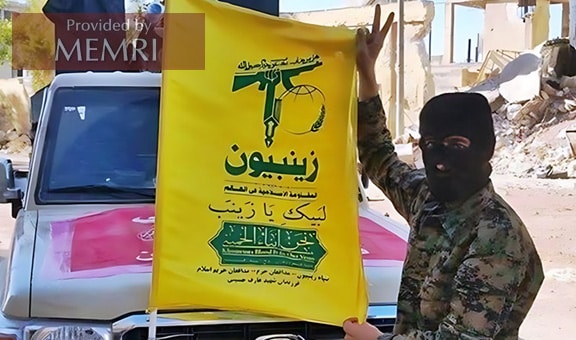
A fighter of the Zainabiyoun Brigade flashing a victory sign and holding a banner that reads "We are here, Oh Zainab" (image courtesy: X)
A few months after the U.S. assassination of Qassem Soleimani, the chief of the elite Quds Force of the Islamic Revolutionary Guard Corps (IRGC) of Iran, on January 3, 2020, Turkish writer Aydın Güven noted that Esmail Qaani, the successor to Soleimani, had also been involved in recruiting Shi'ites from Pakistan to fight in Syria. "Before becoming the head of the Quds Force, Qaani was closely involved in recruiting militants from Pakistan and Afghanistan, as well as their transport to Iran and training," he wrote.[3]
"The Zainabiyoun Brigade, which came to the forefront due to the high casualties they suffered in the UAV and armed UAV attacks carried out by the Turkish Armed Forces in the Idlib operation, is a terrorist group consisting of Pakistani Shi'ites, based mostly around Aleppo and Damascus," Güven observed.[4]
Güven also warned that the new Quds Force chief could also use these fighters to inflame sectarian conflicts in Pakistan in a bid to gain a geostrategic balance in Pakistan-Afghanistan region, stating: "The fact that Qaani has wide networks in the region and knows the region very well is an issue that worries security experts because many find it highly likely that Iran would not shy away from using the trained and experienced militants in the Zainabiyoun Brigade in a likely sectarian conflict in Pakistan."[5]
It is in this context that the Pakistani religious affairs minister's statement made before the Senate's Standing Committee on Religious Affairs and Inter-faith Harmony on July 24, is under scrutiny, especially since the number of the missing Pakistani Shi'ite pilgrims in recent years is alarmingly high at 50,000. According to a report in the Pakistani newspaper The Nation, Chaudhry Salik Hussain, the minister, told the committee that "a large number of Pakistani zaireen [pilgrims] went missing in Iraq during the past years" and the government is "taking steps to check people going abroad through illegal means."[6]
After the Pakistani minister's statement, the foreign ministry of Iraq expressed alarm and sought a clarification from the Pakistani government, which is now scrambling to deny media reports on the issue as baseless.[7] Although the Pakistani minister said that the pilgrims went missing in Iraq, this claim might be a subterfuge to avoid mentioning Iran because most Pakistani Shi'ite pilgrims cross first into Iran via Taftan, a Pakistani border town, and there are concerns that they are recruited into the Zainabiyoun Brigade directly in Iran. The Senate committee was "further told that [pilgrims] for Iran, Iraq, and Syria are monitored at Taftan."[8]
Ihsan Ghani, the former chief of the National Counter Terrorism Authority of Pakistan, has said that Pakistani Shi'ites go to Syria from Iran and Iraq where they go on religious pilgrimages, adding: "Many recruits were lured to participate in the Syrian conflict by the promise of better pay as a fighter and a chance to secure a place for burial in Iran's holy lands, such as Qom."[9]
In 2016, Iran enacted a law to grant citizenship to Pakistani Shi'ites and others who die fighting in Syria. "Members of the [Iranian] parliament authorized the government to grant Iranian citizenship to the wife, children, and parents of foreign martyrs who died on a mission... during the Iran-Iraq war (1980-1988) and afterwards," a report by Iranian news agency IRNA said, adding that such requests for citizenship would be awarded on an expeditious basis "within a maximum period of one year after the request."[10] A Pakistani media report noted: "Iranian media regularly reports on the death of Pakistani and Afghan volunteers in Syria and Iraq, with their bodies are buried in Iran."[11]
Although it is not possible to put the exact number of Pakistani Shi'ites fighting in Syria as part of the Zainabiyoun Brigade, a 2020 media report said more than 800 Pakistanis were fighting in support of the Iran-backed Bashar Al-Assad regime.[12] In March 2020, about 50 Pakistani members of the Zainabiyoun Brigade were killed fighting in Idlib, northwestern Syria.[13] It is a tragedy that Shi'ites, who are being killed in Pakistan, Afghanistan, and elsewhere by Sunnis, are also being used by Iran, the so-called supporter of Shi'ites, to fight in the Arab world.
All these years Pakistan has been aware of the existence of the Zainabiyoun Brigade and Iran's recruitment of Pakistani Shi'ites to fight in Syria and elsewhere. In 2022, the Pakistani government acknowledged that the Zainabiyoun Brigade, accused of recruiting young Pakistani Shi'ites to fight in the Middle East, "is also involved with terrorism," and Rana Sanaullah, then interior minister of Pakistan, informed the Senate: "From 2019-2021, Zainabiyoun was one of 23 active militant groups that were involved in terrorist activities in the country."[14]
One of the reasons Iran cultivates the presence of the Zainabiyoun Brigade and Fatemiyoun Brigade among Shi'ites in Pakistan and Afghanistan respectively is because it is deeply conscious of the support that Sunni jihadi groups like the Afghan Taliban enjoy among the Sunni states of Saudi Arabia, Qatar, Pakistan, the UAE, as well as the West.
In March 2024, the Pakistani government finally banned the Zainabiyoun Brigade, with the interior minister noting that it "is engaged in certain activities which are prejudicial to the peace and security" of Pakistan.[15] Although the interior ministry did not elaborate the reasons for the ban, a media report quoted unidentified Pakistani officials as saying: "Pakistani nationals trained to fight in Syria have been returning home and pose a security threat in a country with a history of deadly rivalry between extremists from the majority Sunni Muslim population and the minority Shi'ite community."[16]
Commenting on the Pakistani ban, which came five years later than a similar ban by the U.S., Abdul Basit Khan, a noted Pakistani analyst, wrote: "Pakistan's decision to ban the Zainabiyoun Brigade will further strain the already tense relationship amid a rapidly evolving situation in the Middle East. Before this, Pakistan had banned two obscure Iran-supported Shi'ite militant outfits, Ansar-ul-Hussain and its offshoot, Khatam-ul-Anbia, under the Anti-Terrorism Act (ATA) 1997, in 2016 and 2020, respectively, for recruiting Pakistani Shi'ites to fight in Syria."[17]
He further noted: "Keeping in view the Middle East's volatile situation, Pakistan fears that Iran could mobilize its proxies, like the Zainabiyoun Brigade, to wage a protracted proxy war against Israel and its interests across the Middle East and has publicly announced the decision to ban the group."[18]
Following are images that reveal the presence of Zainabiyoun Brigade in Pakistan and Iran and show funerals of those killed in Syria:
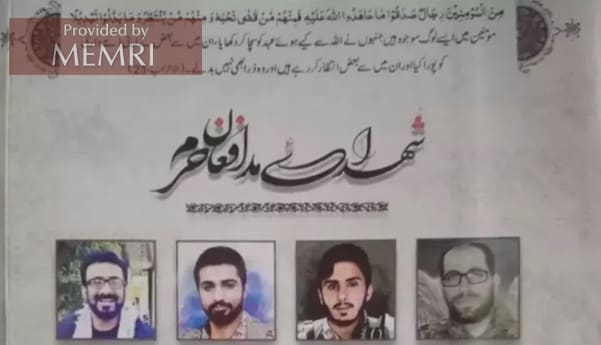
A pamphlet showing Pakistani Shi'ites killed in Syria (courtesy: Zarak Khan)
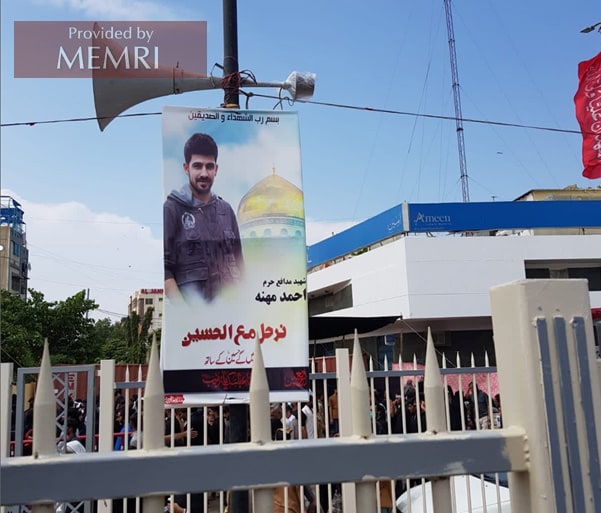
In the streets of Karachi, a poster commemorates Ahmed Mahna, who died fighting as part of the Zainabiyoun Brigade (image courtesy: Facebook, September 30, 2021)
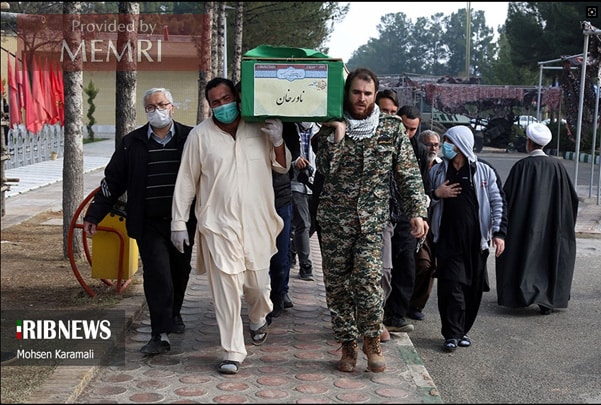
In March 2020, the coffin of Nadir Khan, a Pakistani Shi'ite militiaman of Zainabiyoun Brigade, during a funeral in Iran's Qom city (Image courtesy: IRIB News)
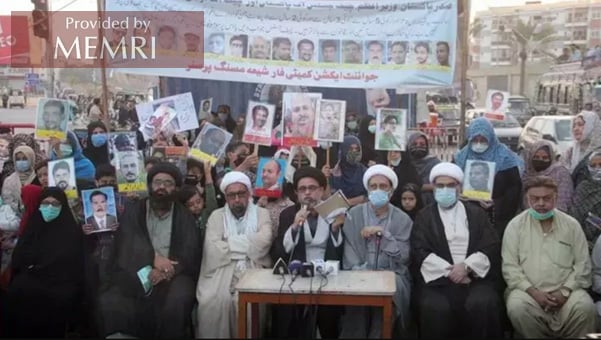
In January 2022, the families of Shi'ites who returned from Syria after taking part in the insurgency and were detained, demanded their sons' release in Karachi (image courtesy: Zarak Khan/Pakistan Forward)
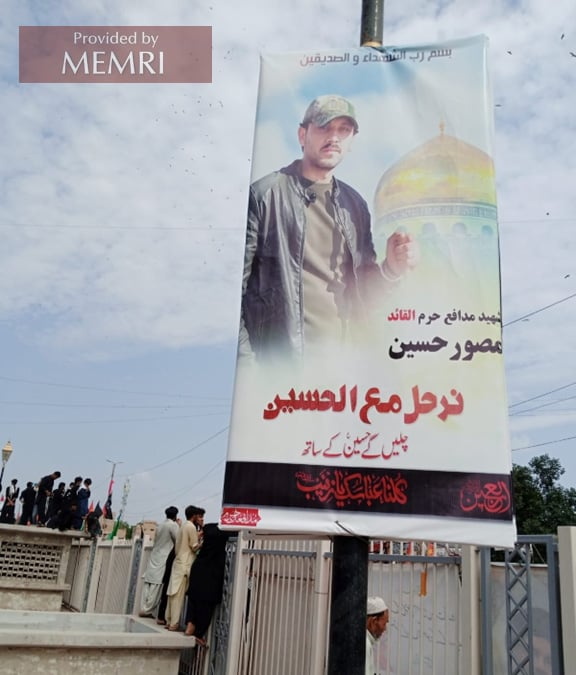
A poster on the streets of Karachi commemorates Musawwar Hussain, who died fighting as part of the Zainabiyoun Brigade (image courtesy: Facebook, September 30, 2021)
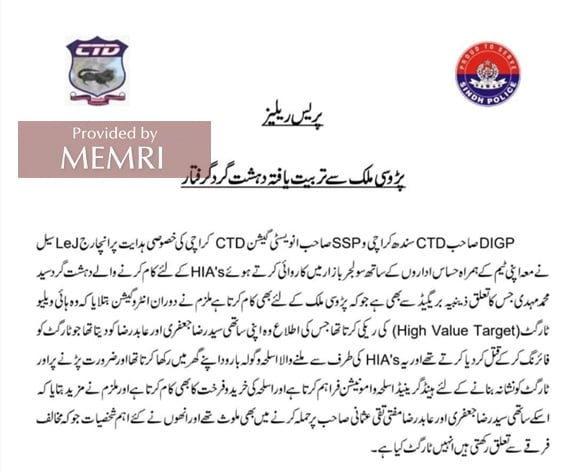
A press release issued by Sindh Police and the Counter-Terrorism Department (CTD) of Karachi noted the arrest of Syed Mohammad Mehdi "who is connected to Zainabiyoun Brigade and works for the neighboring country [of Iran]" – (image: Facebook, January 20, 2024)
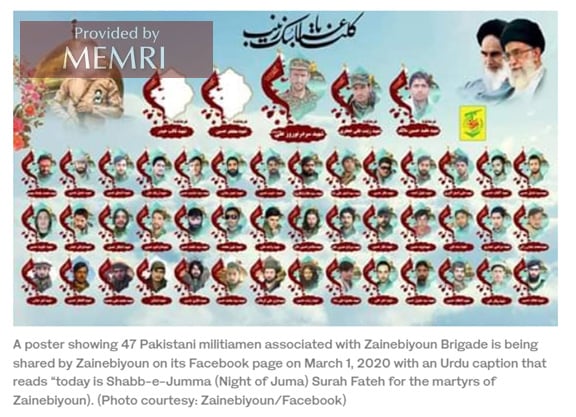
(Image courtesy: Arabnews.com.pk)

A Pakistani Zainabiyoun Brigade commander in the city of al-Bukamal, in the eastern countryside of Deir Ezzor, Syria (image: Facebook)
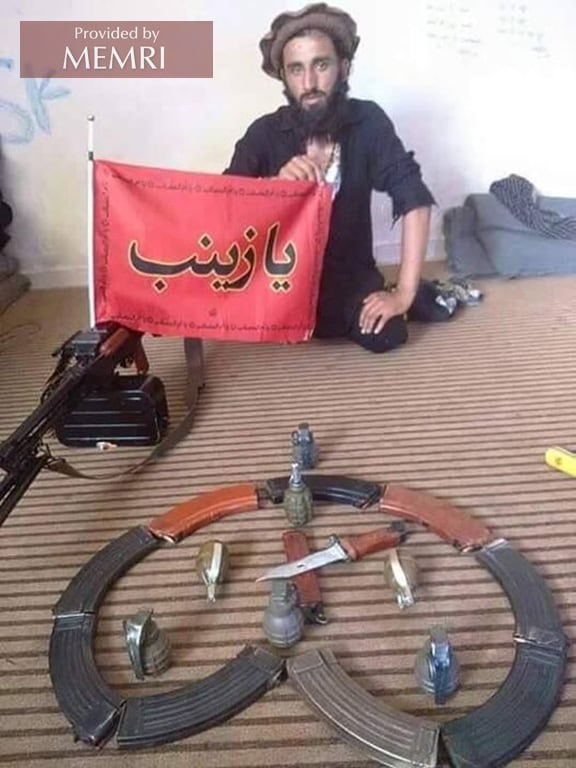
Mehdi Hussein, a Pakistani Shi'ite and member of the Zainabiyoun Brigade, was killed in Aleppo, Syria, in November 2015 (image: Facebook.com)
* Tufail Ahmad is Senior Fellow for the MEMRI Islamism and Counter-Radicalization Initiative.
[1] The Nation (Pakistan), July 25, 2024. The spellings of words from original English sources have been standardized for clarity in this dispatch.
[2] MEMRI Inquiry & Analysis Series No. 1759, Contradicting Evidence, Afghan Taliban Spokesman Zabihullah Mujahid Denies Reports That Iran Is Recruiting Afghans, Child Soldiers For Fatemiyoun Brigade, April 16, 2024.
[3] AA.com.tr (Turkey), November 5, 2020, updated on February 25, 2021.
[4] AA.com.tr (Turkey), November 5, 2020, updated on February 25, 2021.
[5] AA.com.tr (Turkey), November 5, 2020, updated on February 25, 2021.
[6] The Nation (Pakistan), July 25, 2024.
[7] Mofa.gov.iq/2024/48396/, accessed July 29, 2024.
[8] The Nation (Pakistan), July 25, 2024.
[9] Trtworld.com (Turkey), accessed July 28, 2024.
[10] Dawn.com (Pakistan), May 2, 2016.
[11] Dawn.com (Pakistan), May 2, 2016.
[12] Arabnews.pk (Pakistan), March 6, 2020.
[13] Arabnews.pk (Pakistan), March 6, 2020.
[14] Pakistan.asia-news.com (Pakistan, July-August 2022.
[15] Voanews.com (U.S.), April 11, 2024.
[16] Voanews.com (U.S.), April 11, 2024.
[17] Arabnews.pk (Pakistan), April 14, 2024.
[18] Arabnews.pk (Pakistan), April 14, 2024.




